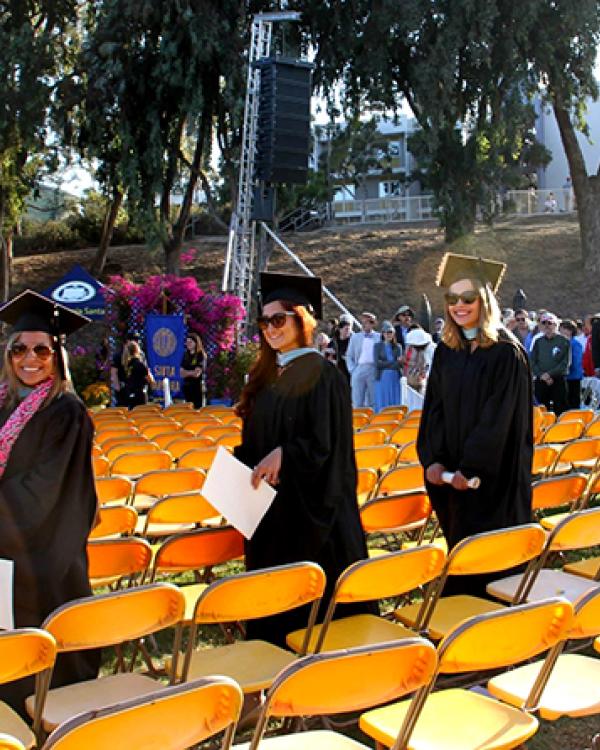
Kelsee Kennedy (third from left) at commencement
Kelsee Kennedy graduated with a Ph.D. from the Department of Education. Her dissertation involves a qualitative analysis of the steps a school team took to build positive behavioral support systems for students with emotional and behavioral disabilities within a full inclusion context over four years. She plans to pursue a teacher education program position or an administrative position where she can continue to work with school teams to meet the needs of students with disabilities.
GGSE: Tell us a little more about your dissertation and the research that went into it.
Kennedy: Students with documented emotional and behavioral disabilities are increasingly being educated in inclusive schooling contexts rather than in more restrictive programs or schools. There are no studies that capture a school team’s implementation process of evidence-based interventions for this population, especially regarding inclusive educational contexts where students are educated in general education classrooms for at least 80% of their school day. My dissertation involves a qualitative analysis of the steps a school team took to build positive behavioral support systems for students with emotional and behavioral disabilities within a full inclusion context over four years. It includes in-depth interviews with teachers, instructional assistants, school psychologists, administrators, and staff working with this population. My results speak to the goodness of fit for a Tiered Fidelity Inventory (TFI), a tool for measuring the implementation of Positive Behavioral Interventions and Supports (PBIS), for students requiring Tier 2 and 3 levels of intervention. I hope to continue this work by identifying the core implementation components and drivers associated with implementing these systems and contributing to the developing field of implementation science.
GGSE: What's one thing that you wish everyone knew about your research?
Kennedy: I think that it’s important to know about my research because there is a strong need for qualitative studies conducted in the field under naturally occurring conditions. Many high-quality, evidence-based practices are not or cannot be implemented with fidelity under the conditions of real-world schooling contexts where teachers and school teams are doing their best to meet student needs. It is important to research the disconnect in these situations to help teams and students get the support and training they need to thrive. This work speaks to the emerging field of implementation science which seeks to identify core components and drivers in order to remove barriers to the implementation of educational initiatives across contexts.
GGSE: What do you see yourself doing in five years?
Kennedy: Going forward, I am interested in teacher education programs or gaining more experience at an administrative level. I value the experiences I have gained working as an instructional assistant and then garnering experience as both a resource/inclusion and SDC [Special Day Class] teacher. These experiences—combined with the opportunities I have had at UCSB teaching in the Teacher Education Program and mentoring teachers in the field—have brought me great fulfillment. I look forward to what the future holds.
GGSE: What's your favorite memory from your time at the GGSE?
Kennedy: This is actually a very challenging question. I have made lifelong connections with peers in my ESC cohort, in addition to having very supportive mentors. One of my favorite on-campus memories has to be the vocabulary parade that I was able to partake in for the Language Arts Methodology Course in the Teacher Education Program with Danielle Whitaker and Ann Lippincott.
GGSE: Is there anyone at the GGSE you'd like to thank?
Kennedy: I have so many people to thank! Thank you to my advisor, George Singer, for your patience and humor as I navigated this process, especially as a first-generation college student with severe imposter syndrome. Thanks to Andrew Fedders for your guidance and the opportunities you provided me to hone my collegiate teaching skills in the Teacher Education Program. Thank you to Natalie Holdren for the incredible mentorship and passion you've shared for the field. Thank you to Danielle Whitaker for being such a collaborative and supportive colleague and friend. Finally, thank you to Mike Gerber and Rachel Lambert for your encouraging words and mentorship during my committee meetings. I am so glad that I chose to enroll in this program.